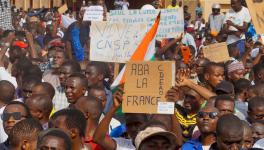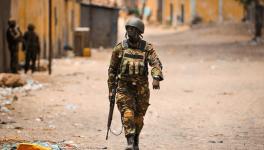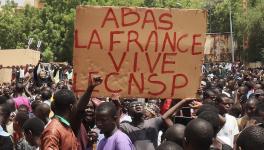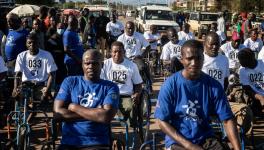Algeria: The Dilemma of Timbuktu's Salafi 'Emirate'
Algeria is coming under significant foreign pressure as it is pushed toward military intervention in North Mali in an attempt to eliminate religious movements seeking to turn the area into an Islamic Salafi emirate. These movements have begun imposing their version of Islamic Sharia rules against “the disobedient" and destroying all religious shrines they deem as blasphemous to the one God.
The pressure has apparently increased with the decline of the National Movement for the Liberation of al-Azawad (NMLA) and the rise of the Ansar al-Din group and the Movement for Unity and Jihad in West Africa (MUJWA) since North Mali declared independence.
The MNLA's loss of its final stronghold of Gao on June 11 caused radical change in the nature of separation from Bamako. Its objective is no longer an independent Tuareg state, but an Islamic emirate that acts as a base for Salafi expansion on the desert coast and the rest of West Africa.
Exercising this pressure on Algeria is the Economic Community of West African States (ECOWAS) and France. Of course, there is also the pressure from the Malian political elite that sees the transitional authority's failure in extending its control over the North as due to the weakness of its legitimacy and the Malian army's substantial loss of weapons and ammunition when it retreated before the rebels.
ECOWAS fears that its military intervention in North Mali without Algerian help would fail; thus, turning the area into a breeding ground for exporting Islamist rebellion to the rest of the region. MUJWA's plan is to "re-Islamize" this entire part of the continent by fighting the US-European presence there.
Meanwhile, France fears the effects of Mali's division on its military and economic interests in the country. It is also concerned about the repercussions on the rest of the coastal countries: nearby Niger, France's main supplier of uranium, and Chad, which is regarded as France's "eastern corner of its African kingdom."
Algeria, however, is resisting the African and French pressure, citing the "sacred principle" of rejecting foreign military intervention in neighboring countries – even if such intervention is to "secure territorial integrity." The latter is another "sacred principle" that Algerian diplomacy cited when rejecting the independence of North Mali after its declaration on 6 April 2012.
These principles that Algeria holds can be explained through its knowledge of the region's shifting sands and fragile political, military, and tribal balances. This knowledge comes from decades of diplomatic and intelligence activity, which culminated with Algerian diplomats' role in mediating peace talks between Bamako and the MNLA.
Had the Libyan situation not exploded, these talks could have been finalized with a solution ending the economic and political marginalization of Tuareg and preventing their country from turning into a "new Afghanistan."
Algeria fears that its direct military intervention in North Mali – especially if insufficiently prepared – would backfire with serious repercussions. Armed Islamist organizations would abduct more Algerian nationals – seven of its consulate employees in Gao were kidnapped on 5 April 2012. More foreign nationals would be kidnapped in Algeria – three Europeans were abducted on 23 October 2011 from a Saharan refugee camp in Tindouf. Algeria would come under other terrorist attacks – following the bombing of a national gendarmerie barrack in Tamanrasset on 3 March 2012.
It has become seemingly clear that Algeria's goal at this stage is not to militarily eliminate Islamist groups that managed – and relatively easily – to defeat a long-standing organization like the MNLA. Its aim is geared toward strengthening the central authority in Bamako. Without Bamako, there is no room to discuss any political (or military) solution in North Mali. There is also no hope without this authority's pledge to end the marginalization of the Azawad region and convincing its residents about the pros of "Mali's territorial integrity."
While seeking to reinforce central rule in Bamako, Algeria is also using its intelligence networks, and perhaps the help of Algeria's Tuareg dignitaries, to persuade northern Mali tribes and Azawadi separatists on the pointless separation. Algeria is working to convince the leaders in the area that separating the North today would mean nothing but turning it into an Islamic emirate and prolonging the cycle of poverty.
We see this diplomatic and intelligence effort as aimed at fighting the Salafis in North Mali through local Tuareg forces, which the Algerian authorities view as more capable than ECOWAS or NATO troops in undermining their power.
This effort could succeed if the necessary military conditions become available – such as arming and perhaps structuring them after guarantees to abandon the demand for independence – and presenting it with adequate political concessions, such as real autonomy and allocating sufficient resources for economic development in the Azawad.
Yassine Temlali is an Algerian writer.
This article is an edited translation from the Arabic Edition.
Get the latest reports & analysis with people's perspective on Protests, movements & deep analytical videos, discussions of the current affairs in your Telegram app. Subscribe to NewsClick's Telegram channel & get Real-Time updates on stories, as they get published on our website.
























